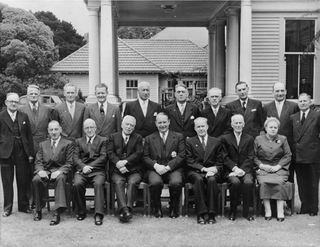
A pension is a fund into which amounts are paid regularly during the individual's working career, and from which periodic payments are made to support the person's retirement from work. A pension may be:
A pension fund, also known as a superannuation fund in some countries, is any program, fund, or scheme which provides retirement income.

Superfund is a United States federal environmental remediation program established by the Comprehensive Environmental Response, Compensation, and Liability Act of 1980 (CERCLA). The program is administered by the Environmental Protection Agency (EPA). The program is designed to investigate and cleanup sites contaminated with hazardous substances. Sites managed under this program are referred to as Superfund sites. There are 40,000 federal Superfund sites across the country, and approximately 1,300 of those sites have been listed on the National Priorities List (NPL). Sites on the NPL are considered the most highly contaminated and undergo longer-term remedial investigation and remedial action (cleanups).
In Australia, superannuation or "super" is a retirement savings system. It involves money earned by an employee being placed into an investment fund to be made legally available to fund members upon retirement.
Cherry picking tax avoidance was a form of tax avoidance used in Australia in the 1970s and early 1980s. Company contributions to a superannuation fund were claimed as tax deductions, but the money immediately went back to the company.

KiwiSaver is a New Zealand savings scheme which has been operating since 2 July 2007. Participants can normally access their KiwiSaver funds only after the age of 65, but can withdraw them earlier in certain limited circumstances, for example if undergoing significant financial hardship or to use a deposit for a first home.

Social welfare has long been an important part of New Zealand society and a significant political issue. It is concerned with the provision by the state of benefits and services. Together with fiscal welfare and occupational welfare, it makes up the social policy of New Zealand. Social welfare is mostly funded through general taxation. Since the 1980s welfare has been provided on the basis of need; the exception is universal superannuation.
An industry superannuation fund are Australian superannuation funds that historically were established by Australian trade unions to manage retirement savings for workers in their industry. Funds other than industry funds are referred to as 'retail funds'.

The Second Labour Government of New Zealand was the government of New Zealand from 1957 to 1960. It was most notable for raising taxes on alcohol, cigarettes and petrol, a move which was probably responsible for the government lasting for only one term. It was headed by the Prime Minister Walter Nash.
Grey Power is a New Zealand-based lobby group that promotes the interests of people over the age of 50.
A Personal Retirement Savings Account (PRSA) is a type of savings account introduced to the Irish market in 2003. In an attempt to increase pension coverage, the Pensions Board introduced a retirement savings account, that would entice the lower paid and self-employed to start making some pension provision. The intention was for PRSAs to supplement any State Retirement Benefits that would be payable in years to come.

The New Zealand Superannuation Fund is a sovereign wealth fund in New Zealand. New Zealand currently provides universal superannuation for people over 65 years of age and the purpose of the Fund is to partially pre-fund the future cost of the New Zealand Superannuation pension, which is expected to increase as a result of New Zealand's ageing population. The fund is a member of the International Forum of Sovereign Wealth Funds and is therefore signed up to the Santiago Principles on best practice in managing sovereign wealth funds.

Z Energy is a New Zealand fuel distributor with branded service stations. It comprises some of the former assets of Shell New Zealand and Chevron New Zealand. Shell left the New Zealand fuel distribution business in April 2010, selling its operations to Infratil and the New Zealand Superannuation Fund. The former Shell operations were rebranded as Z Energy in 2011. Since May 2022, it is a subsidiary of Australian petroleum company Ampol.

Simon Sheikh is an Australian activist who is currently CEO of superannuation fund Future Super. He was the National Director of GetUp! from 2008 to 2012. He was a delegate to the economics stream of the Australia 2020 Summit and was named the New South Wales Young Professional of the Year in 2007.

The "Dancing Cossacks" television advertisement was a 1975 electoral advertisement for the New Zealand National Party, produced by advertising agency Colenso. The first half of the advertisement was animated by Hanna-Barbera, with the second half featuring National Party leader Robert Muldoon. The advert was produced to be highly critical of the governing New Zealand Labour Party's recently introduced compulsory superannuation scheme, implying the scheme would eventually turn New Zealand into a Soviet-style communist state, and urged people to vote for National in the upcoming general election.

State Super is a superannuation fund in Australia that was established in New South Wales in 1919. It serves current and former government employees and public sector workers. As of June 2022, it manages close to $38 billion AUD in assets and has around 90,123 members. State Super offers retirement planning support, including seminars, interviews, and phone assistance, to its members. While the schemes were closed to new members in the late 1980s and early 1990s, it continues to manage defined benefit super and pension schemes for its existing members. In 2019, State Super celebrated its centenary and introduced the State Super Scholarship. The organization is headquartered in Clarence Street, Sydney, NSW, and is led by CEO John Livanas and Chairperson Nicholas Johnson.

Fitzgerald v Muldoon and Others is a 1976 New Zealand Supreme Court case concerning whether press statements by Robert Muldoon had breached section 1 of the Bill of Rights 1688. In its decision, the court ruled "That the pretended power of suspending of laws, or the execution of laws, by regal authority, without consent of Parliament, is illegal". The case has since become one of New Zealand's most important constitutional law decisions.
The New Daily is an online Australian newspaper founded in 2013, owned by Solstice Media. The founding editor, Bruce Guthrie, is as of June 2019 the editorial director.
This page is based on this
Wikipedia article Text is available under the
CC BY-SA 4.0 license; additional terms may apply.
Images, videos and audio are available under their respective licenses.










